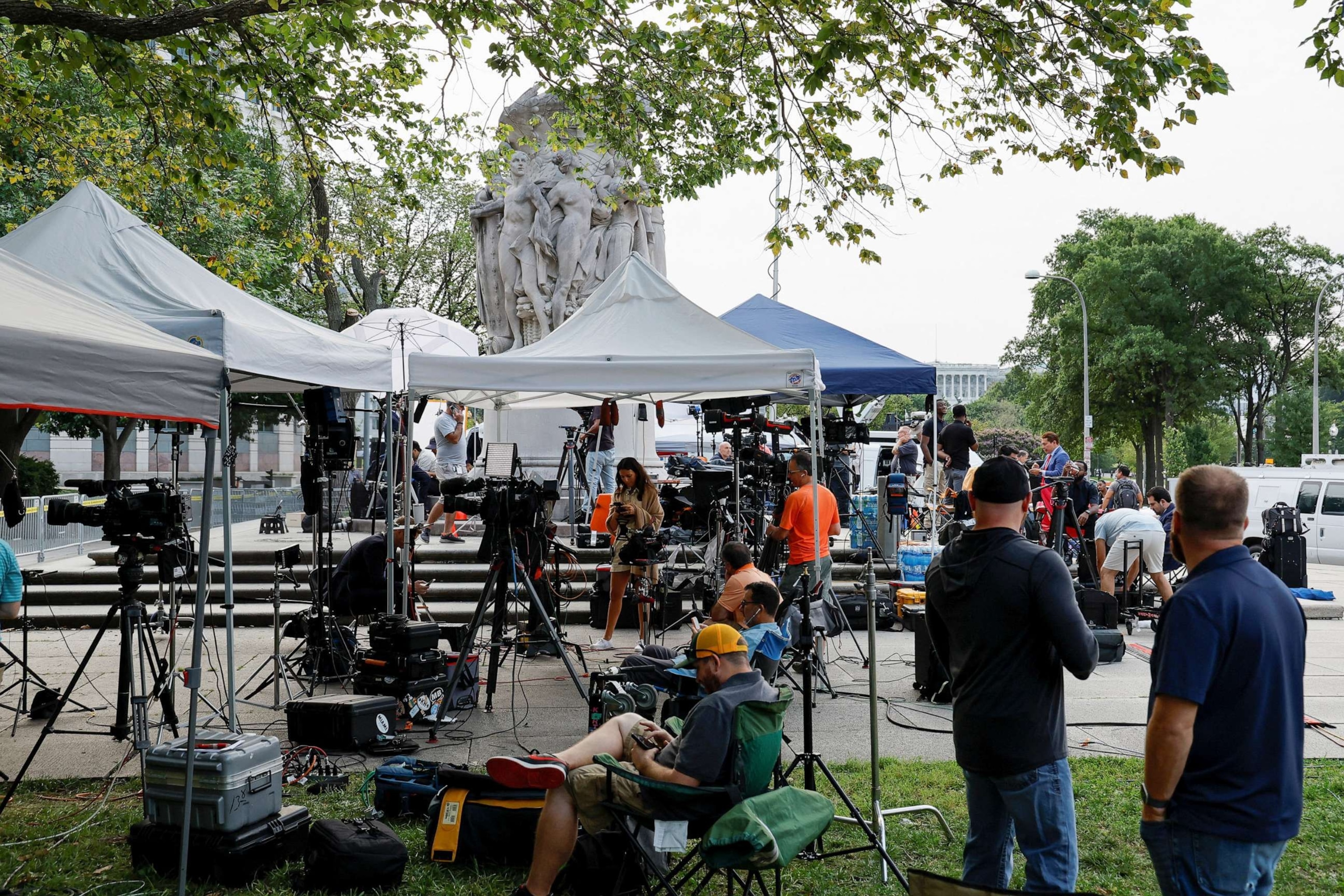Calls for Trump's election interference trial to be televised part of long debate
Some Democrats urge the federal judiciary to make an exception to the rules.
Former President Donald Trump is set to be tried in federal court over alleged attempts to overturn the result of the 2020 presidential election.
Now a debate is growing over whether the American people should be able to watch the historic proceeding unfold.
Federal court rules clearly prohibit photography or video broadcasting of criminal cases. But 38 House Democrats are urging administrators of the federal judiciary to make an exception because of the extraordinary nature of federal charges leveled against the president, which include alleged conspiracies to violate peoples' rights and defraud the nation.
"Given the historic nature of the charges brought forth in these cases, it is hard to imagine a more powerful circumstance for televised proceedings," the lawmakers wrote in a letter to Roslynn Mauskopf, the secretary of the Judicial Conference of the United States.
"If the public is to fully accept the outcome, it will be vitally important for it to witness, as directly as possible, how the trials are conducted, the strength of the evidence adduced and the credibility of witnesses," they added.
The letter was sent Thursday, the same day Trump was arraigned in Washington on a total of four felony counts related to his effort to remain in power after his 2020 election loss. He pleaded not guilty.
Trump has also pleaded not guilty to felony counts in New York in relation to an alleged hush money scheme and to federal charges brought in Florida over his alleged mishandling of government secrets after leaving office.
Attorneys for Trump previously argued in New York that TV cameras in the courtroom would create a "circus-like atmosphere" as well as security concerns. The judge in the case sided with them, barring cameras for his arraignment back in April.
But, in an apparent reversal, Trump attorney John Lauro said last month the first thing he would ask the judge for is cameras in the courtroom if charges were brought with respect to an alleged election interference case.
"I would hope that the Department of Justice would join in that effort so that we can take the curtain away and all Americans can see what's happening," Lauro told Fox News.

Cameras in court have long been a topic of debate, often pitting arguments of the public's right to information with concerns about judicial decorum and procedure.
Neama Rahmani, a former federal prosecutor and president of West Coast Trial Lawyers, told ABC News he is a supporter of cameras in court but didn't believe the Judicial Conference would change the rules as requested by congressional Democrats.
"It's going to be the biggest trial in American history, I get that," Rahmani said of Trump's Jan. 6 indictment. "But I don't think they will be making decisions for all federal cases, civil and criminal, based on one case."
The Judicial Conference has previously tested permitting cameras in federal courts with two pilot programs: one in the 1990s and another in the 2010s.
Both programs received positive reviews from participants, according to Jane Kirtley, a professor of media ethics and law at the University of Minnesota.
The Judicial Conference ultimately declined to alter the existing rules after the second program ended in 2015, stating it didn't produce "sufficient or persuasive evidence of a benefit to the judiciary to justify the negative effect" it could bring.
The Judicial Conference specifically cited concerns witnesses or jurors would be distracted or face increased stress, as well as the cost burden for courts.
Kirtley, who contended presiding judges could address most of the conference's concerns, said her state of Minnesota could serve as an example of how to televise a high-profile, controversial criminal case.
In 2021, when former Minneapolis Police Officer Derek Chauvin was on trial for the murder of George Floyd, Judge Peter Cahill defied state court rules and allowed cameras to livestream the proceedings.
Cahill imposed some restrictions to protect witnesses or jurors, such as only allowing their voice but not their images to be captured on camera -- compromises Kirtley said could be replicated in the Trump case.
"To me, a really strong argument can be made that this [Trump] trial is an extraordinary one, which is what persuaded Judge Cahill here in Minnesota," Kirtley said.

While federal courts currently prohibit cameras in criminal cases, there could be an instance where a Trump trial is televised.
The former president could soon be indicted in Georgia, where Fulton County District Attorney Fani Willis has empaneled a grand jury to weigh possible election-related charges.
There, superior state court rules underscore it is the "policy of Georgia's courts to promote access" to court proceedings and a "properly submitted request for recording should generally be approved, but a judge may deny or limit the request."
"It is certainly possible," said Clark Cunningham, the W. Lee Burge Chair in Law and Ethics at the University of Georgia. "It's very hard to say whether or not it's likely because the criminal trial of a former president is unprecedented."
ABC News' Lauren Peller contributed to this report.



